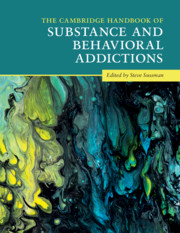Book contents
- The Cambridge Handbook of Substance and Behavioral Addictions
- The Cambridge Handbook of Substance and Behavioral Addictions
- Copyright page
- Contents
- Figures
- Tables
- Contributors
- Foreword
- Preface
- Acknowledgements
- Part I Concepts of Addiction
- Part II Clinical and Research Methods in the Addictions
- Part III Levels of Analysis and Etiology
- Part IV Prevention and Treatment
- 15 Adolescent Drug Misuse Prevention: Challenges in School-Based Programming
- 16 Treatment of Alcohol, Tobacco, and Other Drug (ATOD) Misuse
- 17 Prevention and Treatment of “Food Addiction”
- 18 The Prevention and Treatment of Gambling Disorders: Some Art, Some Science
- 19 Prevention and Treatment of Sex Addiction
- 20 Passionate Love Addiction: An Evolutionary Survival Mechanism That Can Go Terribly Wrong
- 21 Prevention and Treatment of Compulsive Buying Disorder
- 22 Prevention and Treatment of Work Addiction
- 23 Gaming Disorder and Its Treatment
- Part V Ongoing and Future Research Directions
- Index
- References
17 - Prevention and Treatment of “Food Addiction”
from Part IV - Prevention and Treatment
Published online by Cambridge University Press: 13 July 2020
- The Cambridge Handbook of Substance and Behavioral Addictions
- The Cambridge Handbook of Substance and Behavioral Addictions
- Copyright page
- Contents
- Figures
- Tables
- Contributors
- Foreword
- Preface
- Acknowledgements
- Part I Concepts of Addiction
- Part II Clinical and Research Methods in the Addictions
- Part III Levels of Analysis and Etiology
- Part IV Prevention and Treatment
- 15 Adolescent Drug Misuse Prevention: Challenges in School-Based Programming
- 16 Treatment of Alcohol, Tobacco, and Other Drug (ATOD) Misuse
- 17 Prevention and Treatment of “Food Addiction”
- 18 The Prevention and Treatment of Gambling Disorders: Some Art, Some Science
- 19 Prevention and Treatment of Sex Addiction
- 20 Passionate Love Addiction: An Evolutionary Survival Mechanism That Can Go Terribly Wrong
- 21 Prevention and Treatment of Compulsive Buying Disorder
- 22 Prevention and Treatment of Work Addiction
- 23 Gaming Disorder and Its Treatment
- Part V Ongoing and Future Research Directions
- Index
- References
Summary
This chapter reviews current research related to prevention, early interventions, and treatment strategies for "food addiction." However, the paucity of directly relevant investigation resulted in the necessity to broaden the focus to include studies in the area of general addiction disorders, and those targeting compulsive overeating and chronic weight gain. Included are discussions of school-based interventions aimed at reducing caloric intake, such as taxation on sweetened-beverage consumption, and the increased availability of fruits and vegetables in cafeteria menus. Consideration is also extended to discussions about the efficacy of public health policies and regulatory agencies aimed at reducing consumption of highly caloric foods at the population level – based on evidence of their addictive properties. This approach is based on past evidence that increasing prices and decreasing ease of access has reduced use of other addictive substances such as nicotine. Applied to addictive foods, this may indicate that implementing taxes on foods such as sugary candy and soda may aid in reducing consumption. Regarding treatment, although more focused research is still needed, perhaps the most promising evidence-based strategies occur in the field of cognitive interventions, which target hedonic overeating. These approaches are mostly theory driven and mesh with an experimental-medicine approach toward intervention development. It was also concluded that future research should carefully assess possible moderating effects of prevention/intervention and treatment approaches, including individual differences in sex/gender, personality traits such as impulsivity, and varying patterns of compulsive overeating. In addition, it would behoove future researchers to include standardized control groups in order to understand better the theoretical bases on which the interventions and treatments have been developed.
Keywords
- Type
- Chapter
- Information
- The Cambridge Handbook of Substance and Behavioral Addictions , pp. 230 - 240Publisher: Cambridge University PressPrint publication year: 2020
References
- 43
- Cited by

